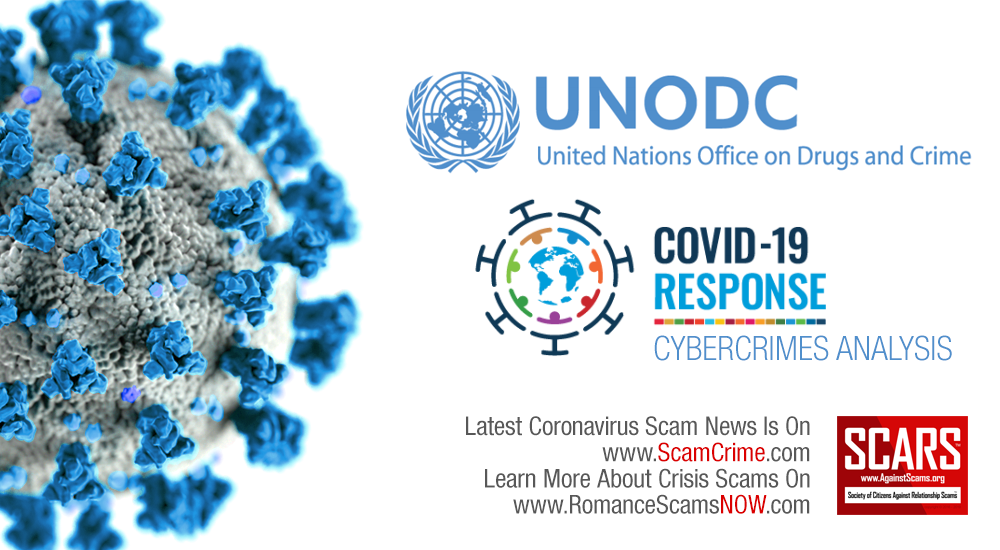
SCARS Institute’s Encyclopedia of Scams™ Published Continuously for 25 Years

SCARS™ Special Report: UNODC Cybercrime And COVID19 Risks and Responses
During the global Chinese Coronavirus Pandemic scammers & cybercriminals worldwide are working overtime to take advantage of this unique opportunity to scam tens of millions of victims.
The following is the analysis of this situation from the United Nations Office on Drugs and Crime – a United Nations oversight body tracking global transnational crime trends. This report is from the UNODC Cybercrime and Anti-Money Laundering Section.
NOTE: Report language was converted to American English for our readers.
KEY JUDGMENTS
There are three Key Judgments:
- Cybercrime is evolving and growing in response to the COVID19 pandemic. Online fraud, extortion, and online child sexual abuse targets individuals whilst ransomware primarily compromises systems – including hospitals. Governments will continue to be targeted by malware. The increasing spread of misinformation and disinformation will continue to confuse the public and undermine the scientific response.
- Home-based working has increased the potential cybercrime victim-pool. People take greater risks online at home which inadvertently exposes corporate IT to cybercriminals. Phishing will continue to enable malicious access to critical systems for criminals and other advanced actors.
- The quantity of specialist law enforcement counter-cybercrime personnel will be reduced throughout most of 2020. Cybercrime will increase in the short-term, and victims will likely face delays in achieving justice. Cybercriminals will exploit perceived operational gaps. Counter-intuitively, this will create tactical and strategic law-enforcement opportunities.
Context
This briefing provides a snapshot of cybercrime threats within the context of the COVID19 pandemic.
It has been sourced from confidential debriefs of UNODC law enforcement, governmental, NGO, academic, media, open-source and private sector partners around the world during early April 2020. Recommendations are presented at the end of each thematic section.
Picture-of-Threat: Evolving, Increasing And Exploiting
- Comprehensive social distancing measures are now in place around the world. This has led to a significant increase in the use of online communication by public authorities, businesses and individuals alike. Many are unfamiliar with the use of online technology at this scale. This has presented a large, attractive and vulnerable target-set for cybercriminals to exploit. Combined with remote working and schooling, there are more Internet users, who are less knowledgeable of threats and are likely to take more risks whilst online at home than they would at work or school.
- Cybercriminals have evolved their criminality to exploit the social, legal, and psychological nuances associated with COVID19. School-age children, both the new and more frequent users of the Internet, are being proactively targeted by online sex offenders. This includes offenders seeking to groom[1] and sextort[2] individual children, through to broader infiltration in online classes[3] now referred to as “Zoom-bombing”.
- Cybercriminals are increasingly preying on people’s fear of the COVID19 virus: offering fake cures for sale on the Internet and defrauding through the sale of non-existent hand-sanitizer and medical Personal Protective Equipment (PPE), medicines or hygiene products. Other frauds include the offer of services such as unsound investment advice (including cryptocurrencies) and incorrect medical advice and diagnosis. One major online pornography site offered free subscription to users from one country, thus increasing the risks of malware downloads and sextortion.
- Senior Citizens, who are often less sensitized to online risks, are explicitly profiled and targeted by cybercriminals to download and forward ransomware-infected links through COVID19 spam emails and spread disinformation amongst friends and family. Cybercriminals continue to seek to extort by claiming to know – and reveal – the victim’s alleged use of online pornography.
- Business Email Compromise[4] (phishing-compromised email accounts which pretend to be a senior official in the target organization) continues to use social-engineering, enhanced by the added urgency of the pandemic, to encourage the movement of funds to a criminal bank, foreign exchange or cryptocurrency account, or is used to obtain sensitive data for malicious use including espionage.
- Darknet forums continue to sell compromised data – including that of high-profile officials and celebrities. Criminals new to “cybercrime” are seeking advice from others on how to best exploit the COVID19 pandemic for profit. Some cybercriminals have sought to dissuade other cybercriminals from targeting hospitals and vaccine-testing laboratories from Distributed Denial of Service (DDOS) and ransomware attacks. Predatory child sex offenders continue to discuss which social network and photo-sharing sites are likely to give them the easiest access to children to abuse. Offenders also continue to debate how to best identify and defeat undercover police officers online.
- In addition to traditional cybercriminals, Advanced Persistent Threat (APT) groups continue to evolve and exploit the pandemic. APTs continue to target Critical National Infrastructure including hospitals and vaccine development labs with malware, ransomware and DDoS attacks. The motivation behind such attacks is not simply profit-based as malware often provides access to login credentials and other sensitive information of intelligence value.
- The success of much of the COVID19-related cyber-criminality relies upon email phishing attacks as the initial vector of infection. When people click on a link or a document, the account is compromised. The compromise may be visible to the victim but, more often, the compromise is covert and enables the criminal to establish and maintain long-term access to the account, organization and associated IT. In addition to gathering sensitive information, the APT actor can deface websites, change the detail of documents, delete data and disseminate misinformation and disinformation.
- UNODC recommends that governments and the private sector increase public awareness campaigns which are culturally sensitive and easy to understand. Anonymous Online Child Sexual Abuse Reporting hotlines are a key facet of the response. We also recommend that security updates continue to be rigorously applied and information routinely backed-up.
Reduced Law Enforcement Capacity And Societal Resilience
- In many countries, specialist counter-cybercrime law enforcement personnel have been diverted from investigating cybercrime offenses to supporting government measures, such as quarantine enforcement, against the COVID19 outbreak. Specialist officials have also become ill. Capacity is likely to reduce further in the coming weeks, reducing the capability of States to counter new and increasing cybercrime threats.
- In several countries, investigative and judicial procedures are disrupted by the need to conduct these activities in-person, which is not possible due to local public health measures. Other countries have rapidly moved to online judicial operations.
- Misinformation and disinformation regarding the virus continue to spread primarily through social media and encrypted messaging services. Social media companies, also challenged by remote working, struggle to cope with the quantity of misinformation content, how to consistently apply internal policies and the impact of local legislation.
- Misinformation, disinformation, and attacks on Critical National Infrastructure undermine public trust and weaken the effectiveness of public safety measures.
- UNODC recommends that judicial procedures should continue online where possible, whilst ensuring that international standards and norms, due process and the rule of law remain.
- We also recommend that Social Media Companies do more to counter the spread of the COVID19 “misinfodemic”, whilst protecting freedoms of speech. Fact-based science must be at the heart of the COVID19 response – we all have a critical role to play in this.
Analysis
- The COVID19 pandemic poses an unprecedented global challenge to all of society. Many have transferred their physical activities to online operations, as have criminals. As cybercrime increases in complexity and victims increase in quantity, law enforcers in some countries are moved to other duties. The economic impact of COVID19 adds a further layer of complexity for the public and for government. A perfect storm of potential cybercriminality emerges.
- Whilst COVID19 and cybercrime threats related to this crisis are global, responses must also be global: countering cybercrime in one jurisdiction reduces risk around the world. Information on new threats and crime types, like Europol’s COVID19 analysis and INTERPOL’s Cyber Threat Assessment, must continue to be shared internationally without delay. Online Child Sexual Abuse reporting hotlines are a critical tool in enabling the public to counter the threat.
- Given the likely strain on both proactive and reactive law-enforcement, we assess that the capacity to actively investigate cybercrime will be challenged in the short-term – especially in countries with limited resources before the pandemic. Cybercriminals, including APT groups, will continue to exploit this. Public reporting of successful arrests or disruptions of cybercriminals who sought to exploit the current crisis must be enhanced. Highly impactive operations, like the Netherlands’ recent take-down of fifteen DDoS providers in one week[5], help to show visible impact and remind cybercriminals that operations continue around the world. Proactive undercover online operations against high-risk cybercrime actors must continue. Counter-intuitively, cybercriminals may take more risks online as they perceive that the likelihood of detection has reduced. Specialist law enforcement investigations must, therefore, continue at pace.
- Public diplomacy and awareness-raising are critical for prevention and must empower vulnerable groups, especially children and seniors. Measures against misinformation and disinformation should provide assessed, credible, and useful information: this must be done in a transparent and accountable manner.
- All measures used to counter cybercrime must continue to be Proportionate, Legal, Accountable, and Necessary. Technology is being used by many governments to assess, identify, and trace potential COVID19 patients. This essential work must remain under review, with clear oversight, to ensure that surveillance measures are withdrawn once the aim of outbreak control is achieved. Now is the time to build cyber-confidence with the public and to work together to counter the most pressing threats of our time. and to build confidence internationally.
- Now is not the time to de-invest in specialist cybercrime law enforcement. The capability and capacity to counter cybercrime are vital components for protecting Critical National Infrastructure, keeping children safe online, empowering industry, securing hospitals and supporting economic recovery from COVID19.
- UNODC’s specialist cybercrime staff are available, around the globe, to support Member States in countering cybercrime, 24 hours a day, 7 days a week.
FOOTNOTES
- https://www.esafety.gov.au/parents/big-issues/unwanted-contact
- https://www.esafety.gov.au/key-issues/image-based-abuse/take-action/deal-with-sextortion
- https://tcrn.ch/3buz3gW
- https://www.trendmicro.com/vinfo/us/security/definition/business-email-compromise-(bec)
- https://www.zdnet.com/article/dutch-police-take-down-15-ddos-services-in-a-week/
TAGS: SCARS, Important Article, Information About Scams, Anti-Scam, Scams, Scammers, Fraudsters, Cybercrime, Crybercriminals, Scam Victims, Coronavirus Scams, Chinese Coronavirus, COVID-19 Scams, Wuhan Virus,
SCARS™ Editorial Team
Society of Citizens Against Relationship Scams Inc.
A Worldwide Crime Victims Assistance Nonprofit Organization
Visit: www.AgainstScams.org
Contact Us: Contact@AgainstScams.org
PLEASE SHARE OUR ARTICLES WITH YOUR FRIENDS & FAMILY
HELP OTHERS STAY SAFE ONLINE – YOUR KNOWLEDGE CAN MAKE THE DIFFERENCE!
The Latest SCARS Posts:
FIND MORE SCAM NEWS
«SCAMCRIME.COM»
JOIN US ON FACEBOOK
«CLICK HERE»
END
MORE INFORMATION
– – –
Tell us about your experiences with Romance Scammers in our
« Scams Discussion Forum on Facebook »
– – –
FAQ: How Do You Properly Report Scammers?
It is essential that law enforcement knows about scams & scammers, even though there is nothing (in most cases) that they can do.
Always report scams involving money lost or where you received money to:
- Local Police – ask them to take an “informational” police report – say you need it for your insurance
- U.S. State Police (if you live in the U.S.) – they will take the matter more seriously and provide you with more help than local police
- Your National Police or FBI « www.IC3.gov »
- The SCARS|CDN™ Cybercriminal Data Network – Worldwide Reporting Network on « www.Anyscam.com »
This helps your government understand the problem, and allows law enforcement to add scammers on watch lists worldwide.
– – –
To learn more about SCARS visit « www.AgainstScams.org »
Please be sure to report all scammers
on « www.Anyscam.com »
Disclaimer:
SCARS IS A DIGITAL PUBLISHER AND DOES NOT OFFER HEALTH OR MEDICAL ADVICE, LEGAL ADVICE, FINANCIAL ADVICE, OR SERVICES THAT SCARS IS NOT LICENSED OR REGISTERED TO PERFORM.
IF YOU’RE FACING A MEDICAL EMERGENCY, CALL YOUR LOCAL EMERGENCY SERVICES IMMEDIATELY, OR VISIT THE NEAREST EMERGENCY ROOM OR URGENT CARE CENTER. YOU SHOULD CONSULT YOUR HEALTHCARE PROVIDER BEFORE FOLLOWING ANY MEDICALLY RELATED INFORMATION PRESENTED ON OUR PAGES.
ALWAYS CONSULT A LICENSED ATTORNEY FOR ANY ADVICE REGARDING LEGAL MATTERS.
A LICENSED FINANCIAL OR TAX PROFESSIONAL SHOULD BE CONSULTED BEFORE ACTING ON ANY INFORMATION RELATING TO YOUR PERSONAL FINANCES OR TAX RELATED ISSUES AND INFORMATION.
This content and other material contained on the website, apps, newsletter, and products (“Content”), is general in nature and for informational purposes only and does not constitute medical, legal, or financial advice; the Content is not intended to be a substitute for licensed or regulated professional advice. Always consult your doctor or other qualified healthcare provider, lawyer, financial or tax professional with any questions you may have regarding the educational information contained herein. SCARS makes no guarantees about the efficacy of information described on or in SCARS’s Content. The information contained are subject to change and are not intended to cover all possible situations or effects. SCARS does not recommend or endorse any specific professional or care provider, product, service, or other information that may be mentioned in SCARS’s websites, apps, and Content unless explicitly identified as such.
The disclaimers herein are provided on this page for ease of reference. These disclaimers supplement and are a part of SCARS’s websites Terms of Use.
Legal Notices:
All original content is Copyright © 1991 – 2020 Society of Citizens Against Relationship Scams Inc. (D.B.A SCARS) All Rights Reserved Worldwide & Webwide. Third-party copyrights acknowledge.
SCARS, SCARS|INTERNATIONAL, SCARS, SCARS|SUPPORT, SCARS, RSN, Romance Scams Now, SCARS|WORLDWIDE, SCARS|GLOBAL, SCARS, Society of Citizens Against Relationship Scams, Society of Citizens Against Romance Scams, SCARS|ANYSCAM, Project Anyscam, Anyscam, SCARS|GOFCH, GOFCH, SCARS|CHINA, SCARS|CDN, SCARS|UK, SCARS|LATINOAMERICA, SCARS|MEMBER, SCARS|VOLUNTEER, SCARS Cybercriminal Data Network, Cobalt Alert, Scam Victims Support Group, are all trademarks of Society of Citizens Against Relationship Scams Inc.
Contact the law firm for the Society of Citizens Against Relationship Scams Incorporated by email at legal@AgainstScams.org
-/ 30 /-
What do you think about this?
Please share your thoughts in a comment below!
Table of Contents
LEAVE A COMMENT?
Recent Comments
On Other Articles
- Arwyn Lautenschlager on Love Bombing And How Romance Scam Victims Are Forced To Feel: “I was love bombed to the point that I would do just about anything for the scammer(s). I was told…” Feb 11, 14:24
- on Dani Daniels (Kira Lee Orsag): Another Scammer’s Favorite: “You provide a valuable service! I wish more people knew about it!” Feb 10, 15:05
- on Danielle Delaunay/Danielle Genevieve – Stolen Identity/Stolen Photos – Impersonation Victim UPDATED 2024: “We highly recommend that you simply turn away form the scam and scammers, and focus on the development of a…” Feb 4, 19:47
- on The Art Of Deception: The Fundamental Principals Of Successful Deceptions – 2024: “I experienced many of the deceptive tactics that romance scammers use. I was told various stories of hardship and why…” Feb 4, 15:27
- on Danielle Delaunay/Danielle Genevieve – Stolen Identity/Stolen Photos – Impersonation Victim UPDATED 2024: “Yes, I’m in that exact situation also. “Danielle” has seriously scammed me for 3 years now. “She” (he) doesn’t know…” Feb 4, 14:58
- on An Essay on Justice and Money Recovery – 2026: “you are so right I accidentally clicked on online justice I signed an agreement for 12k upfront but cd only…” Feb 3, 08:16
- on The SCARS Institute Top 50 Celebrity Impersonation Scams – 2025: “Quora has had visits from scammers pretending to be Keanu Reeves and Paul McCartney in 2025 and 2026.” Jan 27, 17:45
- on Scam Victims Should Limit Their Exposure To Scam News & Scammer Photos: “I used to look at scammers photos all the time; however, I don’t feel the need to do it anymore.…” Jan 26, 23:19
- on After A Scam, No One Can Tell You How You Will React: “This article was very informative, my scams happened 5 years ago; however, l do remember several of those emotions and/or…” Jan 23, 17:17
- on Situational Awareness and How Trauma Makes Scam Victims Less Safe – 2024: “I need to be more observant and I am practicing situational awareness. I’m saving this article to remind me of…” Jan 21, 22:55
ARTICLE META
Important Information for New Scam Victims
- Please visit www.ScamVictimsSupport.org – a SCARS Website for New Scam Victims & Sextortion Victims
- Enroll in FREE SCARS Scam Survivor’s School now at www.SCARSeducation.org
- Please visit www.ScamPsychology.org – to more fully understand the psychological concepts involved in scams and scam victim recovery
If you are looking for local trauma counselors please visit counseling.AgainstScams.org or join SCARS for our counseling/therapy benefit: membership.AgainstScams.org
If you need to speak with someone now, you can dial 988 or find phone numbers for crisis hotlines all around the world here: www.opencounseling.com/suicide-hotlines
A Note About Labeling!
We often use the term ‘scam victim’ in our articles, but this is a convenience to help those searching for information in search engines like Google. It is just a convenience and has no deeper meaning. If you have come through such an experience, YOU are a Survivor! It was not your fault. You are not alone! Axios!
A Question of Trust
At the SCARS Institute, we invite you to do your own research on the topics we speak about and publish, Our team investigates the subject being discussed, especially when it comes to understanding the scam victims-survivors experience. You can do Google searches but in many cases, you will have to wade through scientific papers and studies. However, remember that biases and perspectives matter and influence the outcome. Regardless, we encourage you to explore these topics as thoroughly as you can for your own awareness.
Statement About Victim Blaming
SCARS Institute articles examine different aspects of the scam victim experience, as well as those who may have been secondary victims. This work focuses on understanding victimization through the science of victimology, including common psychological and behavioral responses. The purpose is to help victims and survivors understand why these crimes occurred, reduce shame and self-blame, strengthen recovery programs and victim opportunities, and lower the risk of future victimization.
At times, these discussions may sound uncomfortable, overwhelming, or may be mistaken for blame. They are not. Scam victims are never blamed. Our goal is to explain the mechanisms of deception and the human responses that scammers exploit, and the processes that occur after the scam ends, so victims can better understand what happened to them and why it felt convincing at the time, and what the path looks like going forward.
Articles that address the psychology, neurology, physiology, and other characteristics of scams and the victim experience recognize that all people share cognitive and emotional traits that can be manipulated under the right conditions. These characteristics are not flaws. They are normal human functions that criminals deliberately exploit. Victims typically have little awareness of these mechanisms while a scam is unfolding and a very limited ability to control them. Awareness often comes only after the harm has occurred.
By explaining these processes, these articles help victims make sense of their experiences, understand common post-scam reactions, and identify ways to protect themselves moving forward. This knowledge supports recovery by replacing confusion and self-blame with clarity, context, and self-compassion.
Additional educational material on these topics is available at ScamPsychology.org – ScamsNOW.com and other SCARS Institute websites.
Psychology Disclaimer:
All articles about psychology and the human brain on this website are for information & education only
The information provided in this article is intended for educational and self-help purposes only and should not be construed as a substitute for professional therapy or counseling.
While any self-help techniques outlined herein may be beneficial for scam victims seeking to recover from their experience and move towards recovery, it is important to consult with a qualified mental health professional before initiating any course of action. Each individual’s experience and needs are unique, and what works for one person may not be suitable for another.
Additionally, any approach may not be appropriate for individuals with certain pre-existing mental health conditions or trauma histories. It is advisable to seek guidance from a licensed therapist or counselor who can provide personalized support, guidance, and treatment tailored to your specific needs.
If you are experiencing significant distress or emotional difficulties related to a scam or other traumatic event, please consult your doctor or mental health provider for appropriate care and support.
Also read our SCARS Institute Statement about Professional Care for Scam Victims – click here to go to our ScamsNOW.com website.














![To Be A Scammer? An Overview Of Scammers Fraudsters & Online Con Artists - 2024 [UPDATED] what is a scammer what-is-a-scammer](https://romancescamsnow.com/wp-content/uploads/2021/10/what-is-a-scammer.png)
![New Research Study on Stolen Valor - Military Scams - STUDY NOW COMPLETED [UPDATED] Military Impersonation Research Study New Research Study on Stolen Valor - Military Scams](https://romancescamsnow.com/wp-content/uploads/2022/03/Military-Impersonation-Research-Study.png)







Thank you for your comment. You may receive an email to follow up. We never share your data with marketers.